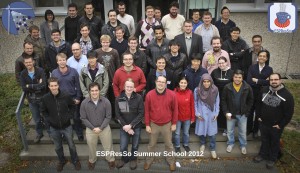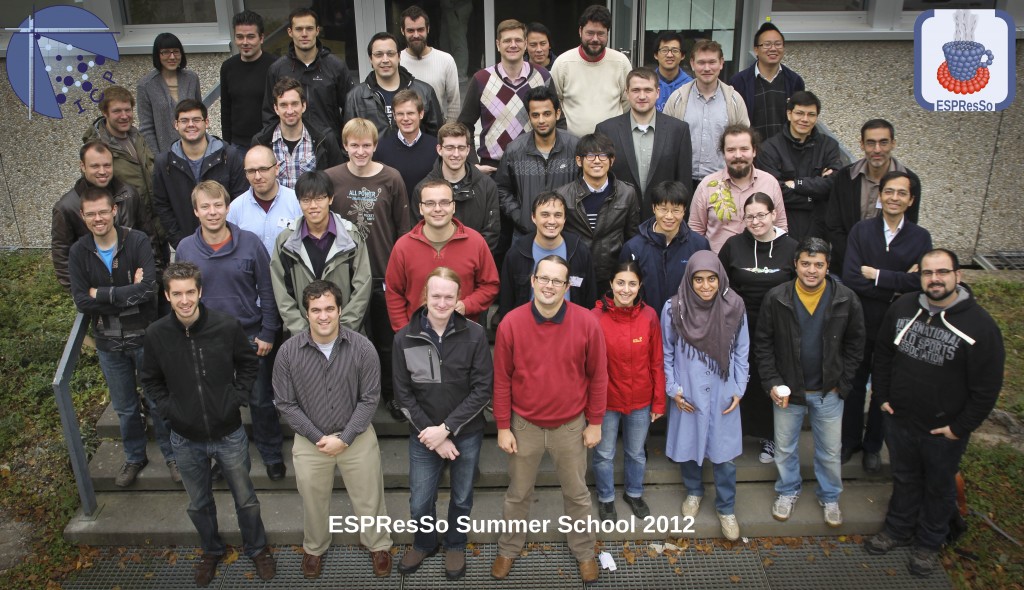Simulating Soft Matter with ESPResSo, ESPResSo++ and VOTCA
October 8, 2012 to October 12, 2012
Institute for Computational Physics, Stuttgart University, Germany
[tab name=”Contents”]
ESPResSo, ESPResSo++ and VOTCA are open-source program packages that have been designed specifically to study coarse-grained soft matter systems, and they are used by more than 100 institutions worldwide. The packages are developed at the ICP at Stuttgart University, Germany and the Max-Planck-Institute for Polymer Research in Mainz, Germany. All three applications are tools that make it significantly easier for PhD students and researchers in general to get started with their projects.
Between October 8-12, ICP, the SimTech Cluster of Excellence at Stuttgart University and CECAM (Centre Européen de Calcul Atomique et Moléculaire) organize the SimTech-CECAM-ESPResSo Summer School 2012. The school provides a detailed and hands-on introduction to the software packages and their uses.
The school consists of Lectures and Hands-on Sessions in two tracks, both for beginners as well as for experienced users and developers of ESPResSo, ESPResSo++ and VOTCA. One track aims to introduce the general ideas and usage of ESPResSo and its most common features for the simulation of a broad variety of soft matter systems. The second track is offering a more in-depth look into the code of the software and additional algorithms and possibilities of ESPResSo++, VOTCA and ADResS. It is aimed to attract researchers who are already familiar with the basic ESPResSo features and want to build on that or want to extend and optimize the code to better match their simulation setups. Furthermore, there will be a Poster Session and Lightning Talks where participants have the opportunity to present their projects and ideas with the other participants and the speakers, and a number of Scientific Talks where scientists will present recent research projects that were done with any of the software packages. Another aim of this school is to give the developers of the software packages feedback on ongoing research on soft matter, so that design decisions better match the needs of the community.
[/tab][tab name=”Program”]
Monday, October 8th
| 8:30 – 9:00 | Registration | |
|---|---|---|
| 9:00 – 9:30 | Welcome Olaf Lenz (ICP Stuttgart, Germany) |
|
| Track 1 | Track 2 | |
| 9:30 – 12:30 | Introduction to Soft Matter Simulations Christian Holm, Olaf Lenz (ICP Stuttgart, Germany)
|
ESPResSo under the hood Axel Arnold , Olaf Lenz (ICP Stuttgart, Germany)
|
| 12:30 – 14:00 | Lunch break | |
| 14:00 – 17:00 | Introduction to Tcl Pedro Sanchez (ICP Stuttgart, Germany) |
Introduction to Python Stefan Kesselheim, Tobias Steinle (ICP Stuttgart, Germany) |
| 17:00 – 18:00 | Lightning Talks | |
Tuesday, October 9th
| Track 1 | Track 2 | |
|---|---|---|
| 9:00 – 12:30 | Introduction to ESPResSo Olaf Lenz (ICP Stuttgart, Germany)
|
Introduction to ESPResSo++ Torsten Stühn (MPIP Mainz, Germany)
|
| 12:30 – 14:00 | Lunch break | |
| 14:00 – 17:30 | Recent and Future Developments of ESPResSo Olaf Lenz (ICP), Stefan Kesselheim (ICP), Rudolf Weeber (ICP), Peter Kosovan (ICP) |
ESPResSo++ and AdResS (Adaptive Resolution Scheme) Torsten Stühn (MPIP Mainz, Germany), Christoph Junghans (Los Alamos National Laboratory, USA), Staš Bevc (National Institute of Chemistry, Ljubljana, Slovenia) |
| 17:30 – | Poster Sessionand BBQ | |
Wednesday, October 10th
| 9:00 – 12:30 | Data Analysis and Visualization Gaël Varoquaux (INRIA, France) |
|
|---|---|---|
| 12:30 – 14:00 | Lunch break | |
| Track 1 | Track 2 | |
| 14:00 – 17:30 | Electrostatic interactions in ESPResSo Axel Arnold (ICP Stuttgart, Germany)
|
Systematic Coarse-Graining with VOTCA Victor Rühle (Cambridge, UK), Christoph Junghans (Los Alamos National Laboratory, USA) |
| 17:30 – | Conference Dinner | |
Thursday, October 11th
| Track 1 | Track 2 | |
|---|---|---|
| 9:00 – 12:30 | Hydrodynamics in ESPResSo Ulf Schiller (FZ Jülich, Germany), Jens Smiatek (ICP Stuttgart, Germany)
|
Systematic Coarse-Graining with VOTCA 2 Victor Rühle (Cambridge, UK), Christoph Junghans (Los Alamos National Laboratory, USA) |
| 12:30 – 14:00 | Lunch break | |
| 14:00 – 17:30 | Simulating Membranes in ESPResSo Mingyang Hu, Patrick Diggins (Carnegie-Mellon University, USA) |
Rare event sampling with FRESHS Kai Kratzer (ICP Stuttgart, Germany) |
Friday, October 12th (Scientific Talks)
| 9:00 – 9:45 | Magnetic Soft Matter: A Simulational Approach Christian Holm (ICP, Germany) |
|---|---|
| 9:45 – 10:30 | Determining the Gaussian curvature modulus of lipid membranes in simulations: A comparative study via global shape transformations and local stress distributions Mingyang Hu (Carnegie-Mellon University, USA) |
| 10:30 – 11:00 | Coffee Break |
| 11:00 – 11:45 | Agglomeration of nano- and micron-sized particles Andreas Kronenburg (Institut für Technische Verbrennung, Universität Stuttgart, Germany) |
| 11:45 – 12:30 | Tracer diffusion in polymers and gels Peter Kosovan (ICP, Germany) |
| 12:30 – 13:00 | Wrap-up Olaf Lenz, Axel Arnold, Christian Holm (ICP, Germany) |
[/tab][tab name=”Useful links”]
- Homepage of ESPResSo
- Homepage of ESPResSo++
- Homepage of VOTCA
- Institute for Computational Physics, Stuttgart University, Germany (Home institution of ESPResSo, Organizing institution)
- Max-Planck-Institute for Polymer Research, Mainz, Germany (Home institution of ESPResSo++ and VOTCA)
- ETAP hotel Stuttgart (recommended hotel)
[/tab][tab name=”Course Material”]
Monday, 8th
- “Welcome” (Presentation, .pdf, 1.3 MB); O. Lenz (ICP)
- Track 1: Introduction to Soft Matter Simulations; C. Holm, O. Lenz (ICP)
- “Introduction to Soft Matter Simulations” (Presentation, .pdf, 3.2 MB)
- “Technical Tricks, Visualization with VMD” (Presentation, .pdf, 923 KB)
- vmd_samples.tar.gz (Sample file archive, .tar.gz, 23MB)
- Track 2: Under the hood; A. Arnold, O. Lenz (ICP)
- “Under the hood” (Presentation, .pdf, 617 KB)
- worksheet.pdf (Worksheet, .pdf, 174 KB)
- liquid.tcl (Sample ESPResSo script, .tcl, 3.4 KB)
- Track 1: Introduction to Tcl; P. Sanchez (ICP)
- “Introduction to Tcl” (Presentation, .pdf, 309 KB)
- handson1.tcl, handson2.tcl, handson3.tcl, handson4.tcl, handson4.sourceme.tcl (Sample Tcl scripts, .tcl)
- Track 2: Introduction to Python (weblink); S. Kesselheim, T. Steinle (ICP)
- Lightning Talks
- “New Feature: Local Bond Order Parameter q6”; D. Röhm (ICP) (Presentation, .pdf, 802 KB)
- “Molecular Dynamics Simulations of Asymmetric Binary Mixtures”; T. Khanna (Birla Institute of Technology and Science, India) (Presentation, .pdf, 194 KB)
- “Dynamical Properties of the Solution Environment near the Microtubule Surface and their Implication to the Interaction with Motor Protein”; A. Azari (Korea Institute for Advanced Studies) (Presentation, .pdf, 57 MB)
Tuesday, 9th
- Track 1: Introduction to ESPResSo; O. Lenz (ICP)
- “Introduction to ESPResSo” (Presentation, .pdf, 2.1 MB)
- worksheet.pdf (Worksheet, .pdf, 206 KB)
- lj.tcl (Sample ESPResSo script, .tcl, 3.8 KB)
- stretched_polymer.tcl (Sample ESPResSo script, .tcl, 6.4 KB)
- Track 2: “Introduction to ESPResSo++” (Presentation, .pdf, 2.4 MB); T. Stühn (MPIP Mainz, Germany)
- Track 1: Recent and Future Developments of ESPResSo; O. Lenz, R. Weeber, S. Kesselheim, P. Kosovan (ICP)
- “Recent and Future Developments of ESPResSo” (Presentation, .pdf, 2.1 MB); O. Lenz (ICP)
- “Rigid Bodies and Dynamic Bonding” (Presentation, .pdf, 8.6 MB); R. Weeber (ICP)
- “Observables and correlations: new analysis concepts in ESPResSo 3.1” (Presentation, .pdf, 286 KB); S. Kesselheim, P. Kosovan (ICP)
- rods.tar.gz (Archive, .tar.gz, 2.3 KB)
- dla.tar.gz (Archive, .tar.gz, 2.1 KB)
- “Correlator Tutorial” (weblink)
- Track 2: ESPResSo++ and AdResS (Adaptive Resolution Scheme); C. Junghans (Los Alamos National Laboratory, USA), S. Bevc (National Institute of Chemistry, Ljubljana, Slovenia)
- “Multi-scale Modeling using the Adaptive Resolution Scheme” (Presentation, .pdf, 2.6 MB); C. Junghans (Los Alamos National Laboratory, USA)
- “ESPResSo++ and ADResS” (Presentation, .pdf, 2.6 MB); S. Bevc (National Institute of Chemistry, Ljubljana, Slovenia)
Wednesday, 10th
- “Scientific Python, Data Analysis and Visualization“; G. Varoquaux (INRIA, France)
- Track 1: Electrostatic interactions in ESPResSo; A. Arnold (ICP, Germany)
- “Long-range interactions: P3M, MMMxD, ELC, MEMD and ICC*” (Presentation, .pdf, 1.7 MB)
- worksheet.pdf (Worksheet, .pdf, 114 KB)
- salt.tcl (Sample ESPResSo script, .tcl, 5.0 KB)
- freeze_salt.tcl (Sample ESPResSo script, .tcl, 6.0 KB)
- Track 2: “Systematic Coarse-Graining with VOTCA” (Presentation, .pdf, 2.6 MB); V. Rühle (Cambridge, UK), C. Junghans (Los Alamos National Laboratory, USA)
Thursday, 11th
- Track 1: Hydrodynamics in ESPResSo; U. Schiller (FZ Jülich, Germany), J. Smiatek (ICP Stuttgart, Germany)
- “Coupling Molecular Dynamics and Lattice Boltzmann to simulate Hydrodynamics and Brownian motion” (Presentation, .pdf, 2.0 MB); U. Schiller (FZ Jülich, Germany)
- “Dissipative Particle Dynamics: An Introduction” (Presentation, .pdf, 1.5 MB); J. Smiatek (ICP)
- “Lattice-Boltzmann Simulations on GPUs” (Presentation, .pdf, 880 KB); D. Röhm (ICP)
- Track 2 : Systematic Coarse-Graining with VOTCA 2; V. Rühle (Cambridge, UK), C. Junghans (Los Alamos National Laboratory, USA)
- Track 1: Simulating Membranes in ESPResSo; M. Hu, P. Diggins (Carnegie-Mellon University, USA)
- talk_mbtools.pdf (Presentation, .pdf, 6.1 MB)
- mbtools_tutorial.pdf (Tutorial, .pdf, 929 KB)
- mbtools_tutorial_files.tar.gz (Archive, .tar.gz, 1.1 MB)
- Track 2: “Rare event sampling with FRESHS” (Presentation, .pdf, 1.3 MB); K. Kratzer (ICP)
Friday, 12th
- “Tunable Magnetic Soft Matter: A Simulational Approach” (Presentation, .pdf, 4.8 MB); C. Holm (ICP)
- “Determining the Gaussian curvature modulus of lipid membranes in simulations: A comparative study via global shape transformations and local stress distributions” (Presentation, .pdf, 8.6 MB); Mingyang Hu (Carnegie-Mellon University, USA)
- “Agglomeration of nano- and micron-sized particles” (Presentation, .pdf, 11 MB); Andreas Kronenburg (Institut für Technische Verbrennung, Universität Stuttgart, Germany)
- “Tracer diffusion in polymers and gels” (Presentation, .pdf, 1.3 MB); Peter Kosovan (ICP)
[/tab][tab name=”Participants”]
Speakers
- Axel Arnold, Institute for Computational Physics, Universität Stuttgart, Germany
- Stas Bevc, National Institute of Chemistry, Ljubljana, Slovenia
- Patrick Diggins, Carnegie-Mellon University, Pittsburgh, USA
- Florian Fahrenberger, Institute for Computational Physics, Universität Stuttgart, Germany
- Christoph Junghans, Los Alamos National Laboratory, USA
- Christian Holm, Institute for Computational Physics, Universität Stuttgart, Germany
- Mingyang Hu, Carnegie-Mellon University, Pittsburgh, USA
- Stefan Kesselheim, Institute for Computational Physics, Universität Stuttgart, Germany
- Peter Kosovan, Institute for Computational Physics, Universität Stuttgart, Germany
- Kai Kratzer, Institute for Computational Physics, Universität Stuttgart, Germany
- Andreas Kronenburg, Institut für Technische Verbrennung, Universität Stuttgart, Germany
- Olaf Lenz, Institute for Computational Physics, Universität Stuttgart, Germany
- Dominic Röhm, Institute for Computational Physics, Universität Stuttgart, Germany
- Victor Rühle, Department of Chemistry, University of Cambridge, United Kingdom
- Pedro Sanchez, Institute for Computational Physics, Universität Stuttgart, Germany
- Ulf Schiller, Forschungszentrum Jülich, Germany
- Jens Smiatek, Institute for Computational Physics, Universität Stuttgart, Germany
- Torsten Stühn, Max Planck Institute for Polymer Research, Mainz, Germany
- Gael Varoquaux, INRIA, France
- Rudolf Weeber, Institute for Computational Physics, Universität Stuttgart, Germany
Participants
- Enrique Abad, Institut für Theoretische Chemie, Universität Stuttgart, Germany
- Bibek Adhikari, Institute for Computational Physics, Universität Stuttgart, Germany
- Arash Azari, Korea Institute for Advanced Study, Seoul, Korea
- Eduardo Robert Cruz-Chu, ETH Zürich, Switzerland
- Gernot Bauer, Institut für technische Thermodynamik, Universität Stuttgart, Germany
- Richard Bingham, Centre for Molecular Nanoscience, University of Leeds, United Kingdom
- José Rafael Bordin, Institute for Computational Physics, Universität Stuttgart, Germany
- Konrad Breitsprecher, Institute for Computational Physics, Universität Stuttgart, Germany
- Manuel Camargo, Universidad Antonio Nariño, Bogota, Columbia
- Rajarshi Chakrabarti, Institute for Computational Physics, Universität Stuttgart, Germany
- Hwan Won Chung, Korea Institute of Science and Technology, South Korea
- Oliver Dannemann, Universität Stuttgart, Germany
- Daniel Förster, Universität Stuttgart, Germany
- Joost de Graaf, Institute for Computational Physics, Universität Stuttgart, Germany
- Owen Hickey, Institute for Computational Physics, Universität Stuttgart, Germany
- Jaanus Karo, Institute of Cybernetics, Tallinn University of Technology, Estonia
- Tarun Khanna, Birla Institute of Technology & Science, Pilani, India
- Karsten Kreis, Max-Planck-Institute for Polymer Research, Mainz, Germany
- Robert Mackenzie, Centre for Biomolecular Sciences, University of Nottingham, United Kingdom
- Henri Menke, Institute for Computational Physics, Universität Stuttgart, Germany
- Andreas Michel, Institute for Computational Physics, Universität Stuttgart, Germany
- Elena Minina, Institute for Computational Physics, Universität Stuttgart, Germany
- Narges Nikoofard, Institute for Advanced Studies in Basic Sciences, Zanjan, Iran
- Harald Oberhofer, Technische Universität München, Germany
- Dusan Racko, Polymer Institute of the Slovak Academy of Sciences, Bratislava, Slovak Republic
- Shervin Rafatnia, Institute for Computational Physics, Universität Stuttgart, Germany
- Georg Rempfer, Institute for Computational Physics, Universität Stuttgart, Germany
- Tobias Richter, Institute for Computational Physics, Universität Stuttgart, Germany
- Jalal Sarabadani, Max-Planck-Institute for Polymer Research, Mainz, Germany
- Christoph Scheurer, Lehrstuhl für Theoretische Chemie, Technische Universität München, Germany
- Karel Sindelka, Faculty of Science, Charles University in Prague, Czech Republic
- Lucie Sucha, Faculty of Science, Charles University in Prague, Czech Republic
- Martin Vögele, Universität Stuttgart, Germany
- Florian Weik, Institute for Computational Physics, Universität Stuttgart, Germany
- Johannes Zemann, Institute for Computational Physics, Universität Stuttgart, Germany
- Heng Zhang, Theory of Soft Condensed Matter, University of Luxembourg, Luxembourg
[/tab][end_tabset]








